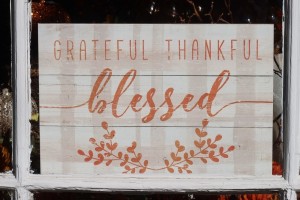You can't afford to forget God's goodness in your life

“Grandma, remember when we blew those humongous bubbles in your backyard?” I asked.
Peppy music from the 1940s brought a nostalgic atmosphere to the assisted living facility’s common room. But my question was fueled by something deeper than nostalgia.
My dear grandmother gave me a puzzled look, one that I had come to recognize as she continued to decline into the throes of Alzheimer’s and dementia. Still, my family had been told that these “remember when” conversations could be good for her mind, provided they didn’t spark frustration.
So, cautiously, gently, I tried again. “Grandma, remember when you taught me ‘Fur Elise’ on your piano?”
A smile crept over my grandma’s lips, her face relaxing into the fond memory. She had been a piano teacher by trade and my piano teacher for 12 years.
“Of course,” she replied. “It was one of our favorites.” She remembered, and it felt good.
God’s call to remember when
Those “remember when” conversations aren’t only a balm for Alzheimer’s patients. They’re healing and strengthening for all of us. Perhaps that’s why God made it such a point to encourage remembrance in the book of Deuteronomy.
As Deuteronomy opens, Israel is poised to enter the Promised Land after 40 years in the wilderness. But before they did, God calls them to remember all He had done for them. Over and over, He pleads with them not to forget. Sixteen times we find the word “remember” in this book alone.
It’s as if He’s saying, “Remember when I miraculously rescued you from slavery? Remember when I parted the sea to deliver you from danger? Remember when I sustained you in the wilderness?”
Take a look at the paraphrased messages in the following passages:
Deuteronomy 4:10: “Remember the power and holiness of God.”
Deuteronomy 5:15: “Remember your suffering and Who saved you from it.”
Deuteronomy 7:18: “Remember God’s power over your enemies, especially when you’re afraid.”
Deuteronomy 8:2-5: “Remember how God provided for you.”
Deuteronomy 8:18: “Remember the blessings for obedience and the consequences for disobedience.”
Deuteronomy 11:2: “Remember, for the sake of the next generation.
Deuteronomy 15:5: Remember, for the sake of humility.
Deuteronomy 16:3: “Remember, with both celebration and somberness.”
Deuteronomy 16:12: “Remember, for the sake of obedience.”
Deuteronomy 24:9: “Remember what God has done in the lives of others.
Deuteronomy 32:7: “Remember — God is always faithful, throughout generations.”
The tone of Deuteronomy is one of heartache, in my opinion. God aches for his chosen people to remember His goodness and to let that remembrance fuel their obedience and subsequent blessing. Forgetting what God had done would lead them to disobedience and its dire consequences. Thus, God yearns for their hearts to remember — not for His sake, but for their own.
In a miniscule metaphor, I felt the same way sitting with my grandma. I yearned for her to “remember when”, not for my sake, but for her own. Because remembering the past makes a powerful impact on what we do in the present.
How we can remember when
Perhaps one of the reasons God was so adamant about “remember when” in Deuteronomy was because He knew what was to come. The all-knowing God of Heaven could see then what we now see in hindsight: They would forget.
If the theme of Deuteronomy is “remember when,” then the theme of Jeremiah is “you forgot.” Jeremiah 18:15 is one of many references to their forgetfulness: “For my people have forgotten Me, they burn incense to worthless gods, and they have stumbled from their ways…”
Promised Land living made God’s chosen people forget to “remember when.” And the result of their forgetfulness was just as God knew it would be — they turned to sin, which in turn brought about unwanted consequences.
Remembering is a choice. And often when we’re deep in the goodness of our own Promised Land era, we too may forget to “remember when.” So, let’s consider some ways that we can actively practice remembering.
- Journaling and re-journaling. When we write down a moment of God’s faithfulness, we document His goodness in the present and allow ourselves the opportunity to remember it later. Regularly looking back through a journal can be a great way to remember God’s work in our lives. Re-journaling about how God used that time of remembrance serves a similar purpose — it creates a new reminder of God’s continued faithfulness.
- Fellowshipping with believers. Sometimes, like my grandma, we need help remembering things. Cataloguing God’s faithfulness with a trusted friend helps us to remember things God did that we may have forgotten. It also helps to bring up other stories of His faithfulness, ones that we may not have experienced ourselves but that relate to our current circumstances.
- Reading the Word. God is the same, always. Remembering what He did in the lives of Biblical men and women serves to bolster our faith today. Because His character never changes, and that’s worth remembering. The God of the mighty ten plagues is our God. The God of deliverance through the Red Sea is our God. The God of miraculous provision in the wilderness is our God.
September is World Alzheimer’s Month. It’s a call to remember those who struggle with a horrible disease of forgetting. It’s a call to remember my grandma.
And for me, as the granddaughter of such an amazing woman of faith, I am going to answer that call by not only remembering her, but remembering the God she served. The same God that I serve.
I’m going invite God to whisper His “remember when” conversations to me: “Remember when I saved you, child? Remember when I protected you, daughter? Remember when I provided for you, my love?”
And I will smile, and relax, and respond, “I remember, Lord. And it feels good.”
Melissa Richeson is a freelance writer and editor based in Central Florida. Her work has been featured in places like The Washington Post, Florida Today, Sunlight Press, BiggerPockets Wealth Magazine, WDW Magazine, and many other outlets. As a Medi-Share member, she shares regularly about her positive CCM experience over the past decade. Melissa can often be found in real life at the beach, or virtually on her freelance website.




























